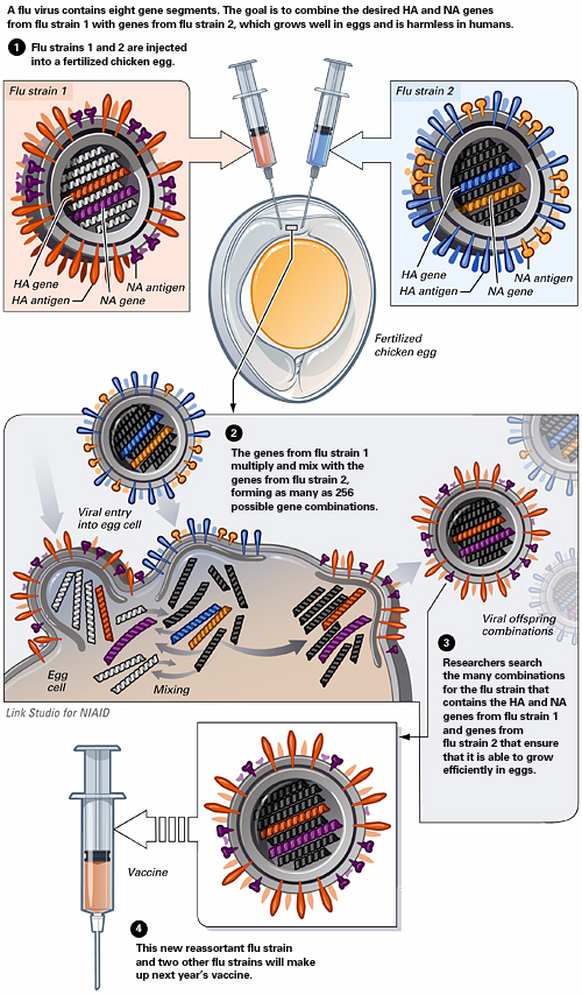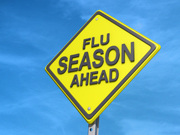
Can a flu shot give you the flu?
No, a flu shot cannot cause flu illness. Flu vaccines that are administered with a needle are currently made in two ways: the vaccine is made either with a) flu vaccine viruses that have been 'inactivated' and are therefore not infectious, or b) with no flu vaccine viruses at all (which is the case for recombinant influenza vaccine). The most common side effects from the influenza shot are soreness, redness, tenderness or swelling where the shot was given. Low-grade fever, headache and muscle aches also may occur.
No, a flu shot cannot cause flu illness. Flu vaccines that are administered with a needle are currently made in two ways: the vaccine is made either with a) flu vaccine viruses that have been 'inactivated' and are therefore not infectious, or b) with no flu vaccine viruses at all (which is the case for recombinant influenza vaccine). The most common side effects from the influenza shot are soreness, redness, tenderness or swelling where the shot was given. Low-grade fever, headache and muscle aches also may occur.
In randomized, blinded studies, where some people get inactivated flu shots and others get salt-water shots, the only differences in symptoms was increased soreness in the arm and redness at the injection site among people who got the flu shot. There were no differences in terms of body aches, fever, cough, runny nose or sore throat.
Can the nasal spray flu vaccine give you the flu?
The nasal spray vaccine cannot give you the flu. The viruses contained in the nasal spray flu vaccine are attenuated (i.e., weakened), which means they cannot cause flu illness. These weakened viruses are also cold-adapted, meaning they are designed to only cause mild infection at the cooler temperatures found within the nose. These viruses cannot infect the lungs or other areas of the body where warmer temperatures exist. The nasal spray is well tolerated and the most commonly reported side effects are mild and include runny nose, nasal congestion and cough. Another option for flu vaccination which may be available soon is The Flu Patch.
Do I really need a flu vaccine every year?
Yes. CDC recommends a yearly flu vaccine for just about everyone 6 months and older, even when the viruses the vaccine protects against have not changed from the previous season. The reason for this is that a person's immune protection from vaccination declines over time, so an annual vaccination is needed to get the “optimal” or best protection against the flu.
Why do some people not feel well after getting the seasonal flu vaccine?
Some people report having mild reactions to flu vaccination. Common reactions to the flu shot and the nasal spray flu vaccine are described below.
Reactions to the flu shot:
The most common reaction to the flu shot in adults has been soreness, redness or swelling at the spot where the shot was given. This usually lasts less than two days. This initial soreness is most likely the result of the body's early immune response reacting to a foreign substance entering the body. Other reactions following the flu shot are usually mild and can include a low grade fever and aches. If these reactions occur, they usually begin soon after the shot and last 1-2 days. The most common reactions people have to flu vaccine are considerably less severe than the symptoms caused by actual flu illness.
Reactions to nasal spray flu vaccine:
People also may have mild reactions to the nasal spray vaccine. Some children and young adults 2-17 years of age have reported experiencing mild reactions after receiving nasal spray flu vaccine, including runny nose, nasal congestion or cough, chills, tiredness/weakness, sore throat and headache. Some adults 18-49 years of age have reported runny nose or nasal congestion, cough, chills, tiredness/weakness, sore throat and headache. These side effects are mild and short-lasting, especially when compared to symptoms of seasonal flu infection.
What about people who get a seasonal flu vaccine and still get sick with flu-like symptoms?
There are several reasons why someone might get a flu-like illness, even after they have been vaccinated against flu.
*All information and data above has been taken from the Center for Disease Control and Prevention. Please reference link below for more detailed information about flu vaccines and influenza disease.
http://www.cdc.gov/flu/about/qa/misconceptions.htm
Can the nasal spray flu vaccine give you the flu?
The nasal spray vaccine cannot give you the flu. The viruses contained in the nasal spray flu vaccine are attenuated (i.e., weakened), which means they cannot cause flu illness. These weakened viruses are also cold-adapted, meaning they are designed to only cause mild infection at the cooler temperatures found within the nose. These viruses cannot infect the lungs or other areas of the body where warmer temperatures exist. The nasal spray is well tolerated and the most commonly reported side effects are mild and include runny nose, nasal congestion and cough. Another option for flu vaccination which may be available soon is The Flu Patch.
Do I really need a flu vaccine every year?
Yes. CDC recommends a yearly flu vaccine for just about everyone 6 months and older, even when the viruses the vaccine protects against have not changed from the previous season. The reason for this is that a person's immune protection from vaccination declines over time, so an annual vaccination is needed to get the “optimal” or best protection against the flu.
Why do some people not feel well after getting the seasonal flu vaccine?
Some people report having mild reactions to flu vaccination. Common reactions to the flu shot and the nasal spray flu vaccine are described below.
Reactions to the flu shot:
The most common reaction to the flu shot in adults has been soreness, redness or swelling at the spot where the shot was given. This usually lasts less than two days. This initial soreness is most likely the result of the body's early immune response reacting to a foreign substance entering the body. Other reactions following the flu shot are usually mild and can include a low grade fever and aches. If these reactions occur, they usually begin soon after the shot and last 1-2 days. The most common reactions people have to flu vaccine are considerably less severe than the symptoms caused by actual flu illness.
Reactions to nasal spray flu vaccine:
People also may have mild reactions to the nasal spray vaccine. Some children and young adults 2-17 years of age have reported experiencing mild reactions after receiving nasal spray flu vaccine, including runny nose, nasal congestion or cough, chills, tiredness/weakness, sore throat and headache. Some adults 18-49 years of age have reported runny nose or nasal congestion, cough, chills, tiredness/weakness, sore throat and headache. These side effects are mild and short-lasting, especially when compared to symptoms of seasonal flu infection.
What about people who get a seasonal flu vaccine and still get sick with flu-like symptoms?
There are several reasons why someone might get a flu-like illness, even after they have been vaccinated against flu.
- One reason is that some people can become ill from other respiratory viruses besides flu such as rhinoviruses, which are associated with the common cold, cause symptoms similar to flu, and also spread and cause illness during the flu season. The flu vaccine only protects against influenza viruses, not other viruses.
- Another explanation is that it is possible to be exposed to influenza viruses, which cause the flu, shortly before getting vaccinated or during the two-week period after vaccination that it takes the body to develop immune protection. This exposure may result in a person becoming ill with flu before protection from the vaccine takes effect.
- A third reason why some people may experience flu like symptoms despite getting vaccinated is that they may have been exposed to a flu virus that is very different from the viruses the vaccine is designed to protect against. The ability of a flu vaccine to protect a person depends largely on the similarity or “match” between the viruses selected to make the vaccine and those spreading and causing illness. There are many different flu viruses that spread and cause illness among people. For more information, see Influenza (Flu) Viruses.
- The final explanation for experiencing flu-like symptoms after vaccination is that unfortunately, the flu vaccine doesn't always provide adequate protection against the flu. This is more likely to occur among people that have weakened immune systems or people age 65 and older.
*All information and data above has been taken from the Center for Disease Control and Prevention. Please reference link below for more detailed information about flu vaccines and influenza disease.
http://www.cdc.gov/flu/about/qa/misconceptions.htm


 RSS Feed
RSS Feed
